人教版高中英语词汇经典例句整理----必修三分析
- 格式:doc
- 大小:296.00 KB
- 文档页数:48
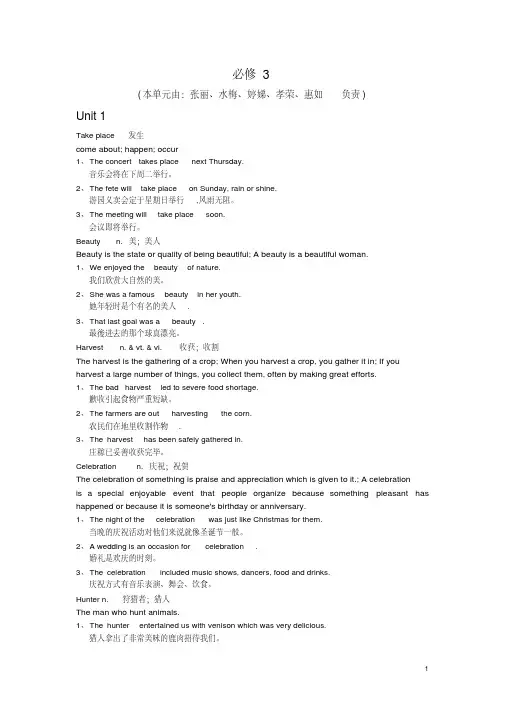
必修3(本单元由:张丽、水梅、婷娣、孝荣、惠如负责)Unit 1Take place 发生come about; happen; occur1、The concert takes place next Thursday.音乐会将在下周二举行。
2、The fete will take place on Sunday, rain or shine.游园义卖会定于星期日举行,风雨无阻。
3、The meeting will take place soon.会议即将举行。
Beauty n. 美;美人Beauty is the state or quality of being beautiful; A beauty is a beautiful woman.1、We enjoyed the beauty of nature.我们欣赏大自然的美。
2、She was a famous beauty in her youth.她年轻时是个有名的美人.3、That last goal was a beauty.最後进去的那个球真漂亮。
Harvest n. & vt. & vi. 收获;收割The harvest is the gathering of a crop; When you harvest a crop, you gather it in; If you harvest a large number of things, you collect them, often by making great efforts.1、The bad harvest led to severe food shortage.歉收引起食物严重短缺。
2、The farmers are out harvesting the corn.农民们在地里收割作物.3、The harvest has been safely gathered in.庄稼已妥善收获完毕。
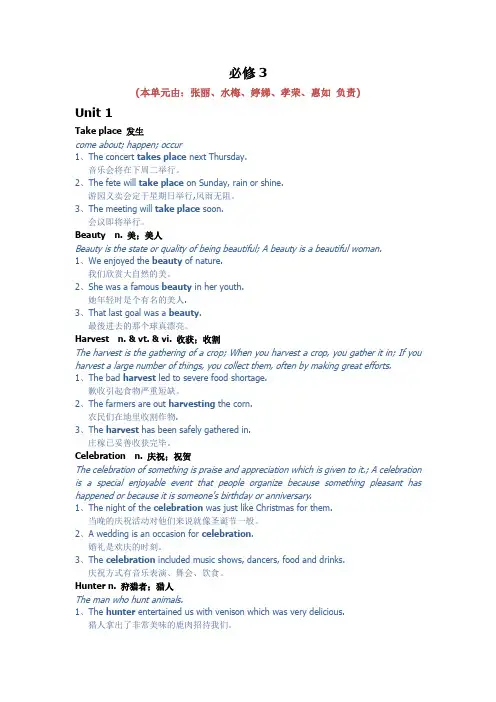
必修3(本单元由:张丽、水梅、婷娣、孝荣、惠如负责)Unit 1Take place 发生come about; happen; occur1、The concert takes place next Thursday.音乐会将在下周二举行。
2、The fete will take place on Sunday, rain or shine.游园义卖会定于星期日举行,风雨无阻。
3、The meeting will take place soon.会议即将举行。
Beauty n. 美;美人Beauty is the state or quality of being beautiful; A beauty is a beautiful woman.1、We enjoyed the beauty of nature.我们欣赏大自然的美。
2、She was a famous beauty in her youth.她年轻时是个有名的美人.3、That last goal was a beauty.最後进去的那个球真漂亮。
Harvest n. & vt. & vi. 收获;收割The harvest is the gathering of a crop; When you harvest a crop, you gather it in; If you harvest a large number of things, you collect them, often by making great efforts.1、The bad harvest led to severe food shortage.歉收引起食物严重短缺。
2、The farmers are out harvesting the corn.农民们在地里收割作物.3、The harvest has been safely gathered in.庄稼已妥善收获完毕。
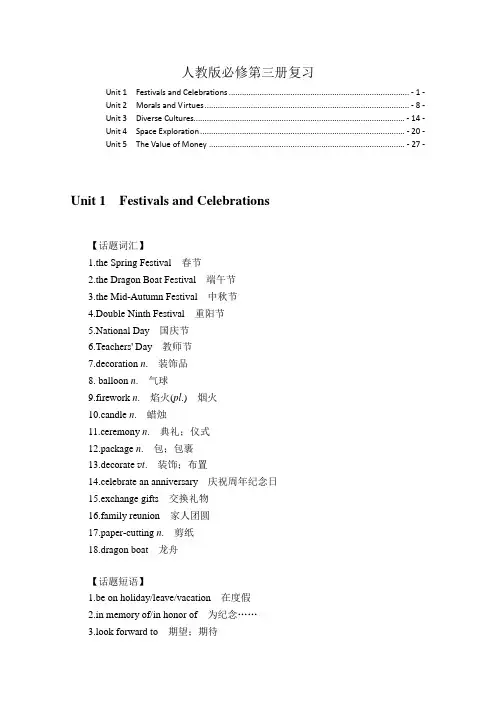
人教版必修第三册复习Unit 1Festivals and Celebrations .................................................................................. - 1 - Unit 2Morals and Virtues ............................................................................................. - 8 - Unit 3Diverse Cultures................................................................................................ - 14 - Unit 4Space Exploration ............................................................................................. - 20 - Unit 5The Value of Money ......................................................................................... - 27 -Unit 1Festivals and Celebrations【话题词汇】1.the Spring Festival 春节2.the Dragon Boat Festival 端午节3.the Mid-Autumn Festival 中秋节4.Double Ninth Festival 重阳节5.National Day 国庆节6.Teachers' Day 教师节7.decoration n. 装饰品8. balloon n. 气球9.firework n. 焰火(pl.) 烟火10.candle n. 蜡烛11.ceremony n. 典礼;仪式12.package n. 包;包裹13.decorate v t. 装饰;布置14.celebrate an anniversary 庆祝周年纪念日15.exchange gifts 交换礼物16.family reunion 家人团圆17.paper-cutting n. 剪纸18.dragon boat 龙舟【话题短语】1.be on holiday/leave/vacation 在度假2.in memory of/in honor of 为纪念……3.look forward to 期望;期待4.dress up 打扮;装扮5.turn up 出现;到场6.celebrate the festival 庆祝节日7.have fun with 玩得开心8.of good/poor quality 质量好/坏9.a display of fireworks 烟火表演10.hold one's breath 屏息;屏气【话题佳句】1.What we love most is the time when the whole family enjoy the full moon together.我们最喜爱的是一家人一起赏满月的时刻。
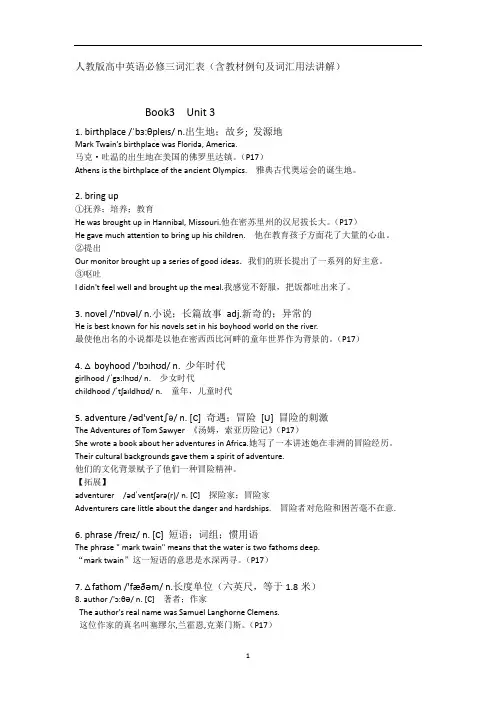
人教版高中英语必修三词汇表(含教材例句及词汇用法讲解)Book3 Unit 31. birthplace /ˈbɜ:θpleɪs/ n.出生地;故乡; 发源地Mark Twain’s birthplace was Florida, America.马克·吐温的出生地在美国的佛罗里达镇。
(P17)Athens is the birthplace of the ancient Olympics. 雅典古代奥运会的诞生地。
2. bring up①抚养;培养;教育He was brought up in Hannibal, Missouri.他在密苏里州的汉尼拔长大。
(P17)He gave much attention to bring up his children. 他在教育孩子方面花了大量的心血。
②提出Our monitor brought up a series of good ideas.我们的班长提出了一系列的好主意。
③呕吐I didn't feel well and brought up the meal.我感觉不舒服,把饭都吐出来了。
3. novel /'nɒvəl/ n.小说;长篇故事adj.新奇的;异常的He is best known for his novels set in his boyhood world on the river.最使他出名的小说都是以他在密西西比河畔的童年世界作为背景的。
(P17)4. △ boyhood /'bɔɪhʊd/ n. 少年时代girlhood /ˈgɜ:lhʊd/ n. 少女时代childhood /ˈtʃaɪldhʊd/ n. 童年,儿童时代5. adventure /əd'ventʃə/ n. [C] 奇遇;冒险[U] 冒险的刺激The Adventures of Tom Sawyer 《汤姆,索亚历险记》(P17)She wrote a book about her adventures in Africa.她写了一本讲述她在非洲的冒险经历。
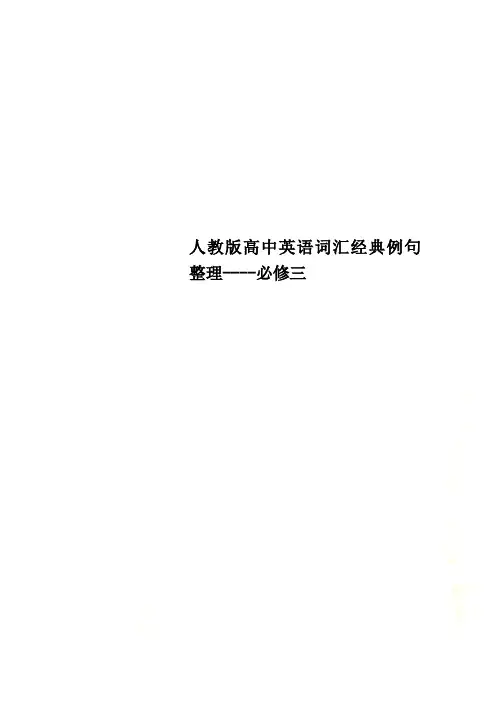
人教版高中英语词汇经典例句整理----必修三1、The night of the celebration was just like Christmas for them.当晚的庆祝活动对他们来说就像圣诞节一般。
2、A wedding is an occasion for celebration.婚礼是欢庆的时刻。
3、The celebration included music shows, dancers, food and drinks.庆祝方式有音乐表演、舞会、饮食。
Hunter n. 狩猎者;猎人The man who hunt animals.1、The hunter entertained us with venison which was very delicious.猎人拿出了非常美味的鹿肉招待我们。
2、The hunter put the lion's head on the wall as a trophy.猎人把狮子的头挂在墙上当纪念品。
3、The hunter seized a porcupine.猎人捕获了一只豪猪。
Starve vi. & vt. (使)饿死;饿得要死If people starve, they suffer greatly fromlack of food which sometimes leads to their death.1、Thousands of cattle are starving.成千上万的牛正在挨饿.2、They tried to starve him into submission.他们试图用饥饿来使他屈服。
3、Don't starve the kitten.别饿着小猫。
Origin n. 起源;由来;起因The point at which something comes into existence or from which it derives or is derived.1、The origins of the custom are unknown.该风俗起源不详.2、The illness is organic in origin.该病起初是器质性疾患。
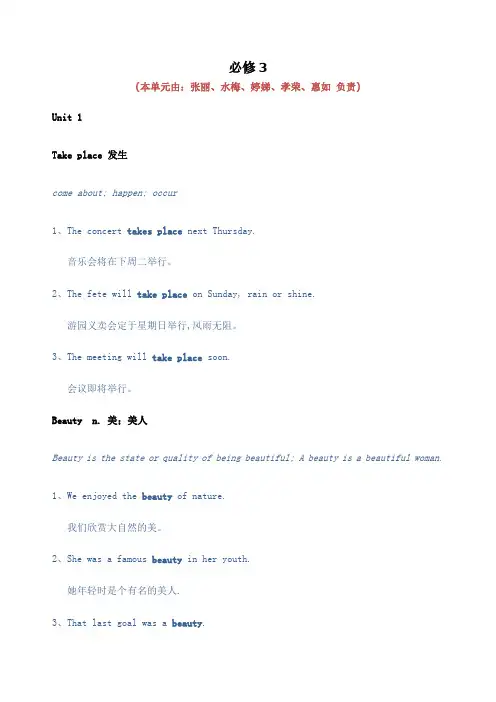
必修3(本单元由:张丽、水梅、婷娣、孝荣、惠如负责)Unit 1Take place 发生come about; happen; occur1、The concert takes place next Thursday.音乐会将在下周二举行。
2、The fete will take place on Sunday, rain or shine.游园义卖会定于星期日举行,风雨无阻。
3、The meeting will take place soon.会议即将举行。
Beauty n. 美;美人Beauty is the state or quality of being beautiful; A beauty is a beautiful woman.1、We enjoyed the beauty of nature.我们欣赏大自然的美。
2、She was a famous beauty in her youth.她年轻时是个有名的美人.3、That last goal was a beauty.最後进去的那个球真漂亮。
Harvest n. & vt. & vi. 收获;收割The harvest is the gathering of a crop; When you harvest a crop, you gather it in; If you harvest a large number of things, you collect them, often by making great efforts.1、The bad harvest led to severe food shortage.歉收引起食物严重短缺。
2、The farmers are out harvesting the corn.农民们在地里收割作物.3、The harvest has been safely gathered in.庄稼已妥善收获完毕。
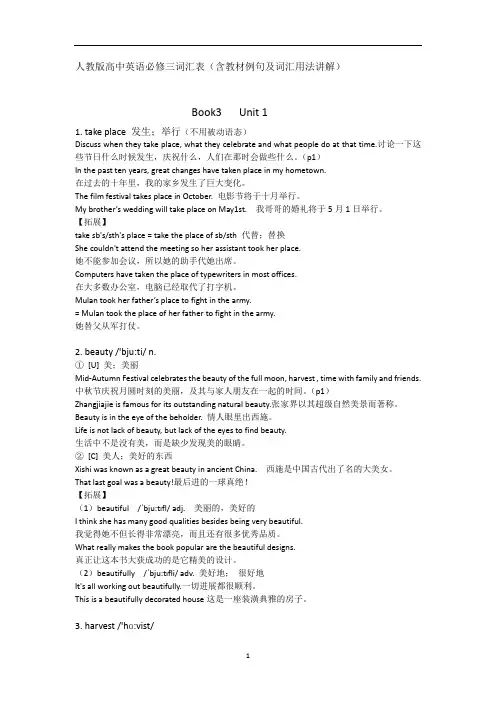
人教版高中英语必修三词汇表(含教材例句及词汇用法讲解)Book3 Unit 11. take place 发生;举行(不用被动语态)Discuss when they take place, what they celebrate and what people do at that time.讨论一下这些节日什么时候发生,庆祝什么,人们在那时会做些什么。
(p1)In the past ten years, great changes have taken place in my hometown.在过去的十年里,我的家乡发生了巨大变化。
The film festival takes place in October. 电影节将于十月举行。
My brother’s wedding will take place on May1st. 我哥哥的婚礼将于5月1日举行。
【拓展】take sb's/sth's place = take the place of sb/sth 代替;替换She couldn't attend the meeting so her assistant took her place.她不能参加会议,所以她的助手代她出席。
Computers have taken the place of typewriters in most offices.在大多数办公室,电脑已经取代了打字机。
Mulan took her father’s place to fight in the army.= Mulan took the place of her father to fight in the army.她替父从军打仗。
2. beauty /'bju:ti/ n.①[U] 美;美丽Mid-Autumn Festival celebrates the beauty of the full moon, harvest , time with family and friends.中秋节庆祝月圆时刻的美丽,及其与家人朋友在一起的时间。
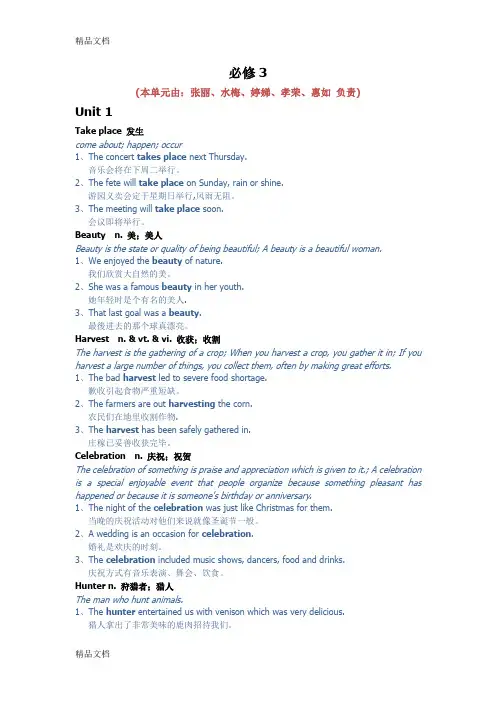
必修3(本单元由:张丽、水梅、婷娣、孝荣、惠如负责)Unit 1Take place 发生come about; happen; occur1、The concert takes place next Thursday.音乐会将在下周二举行。
2、The fete will take place on Sunday, rain or shine.游园义卖会定于星期日举行,风雨无阻。
3、The meeting will take place soon.会议即将举行。
Beauty n. 美;美人Beauty is the state or quality of being beautiful; A beauty is a beautiful woman.1、We enjoyed the beauty of nature.我们欣赏大自然的美。
2、She was a famous beauty in her youth.她年轻时是个有名的美人.3、That last goal was a beauty.最後进去的那个球真漂亮。
Harvest n. & vt. & vi. 收获;收割The harvest is the gathering of a crop; When you harvest a crop, you gather it in; If you harvest a large number of things, you collect them, often by making great efforts.1、The bad harvest led to severe food shortage.歉收引起食物严重短缺。
2、The farmers are out harvesting the corn.农民们在地里收割作物.3、The harvest has been safely gathered in.庄稼已妥善收获完毕。
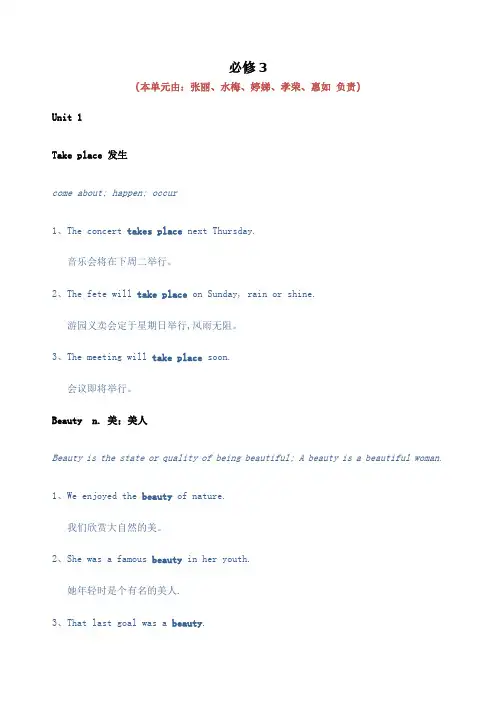
必修3(本单元由:张丽、水梅、婷娣、孝荣、惠如负责)Unit 1Take place 发生come about; happen; occur1、The concert takes place next Thursday.音乐会将在下周二举行。
2、The fete will take place on Sunday, rain or shine.游园义卖会定于星期日举行,风雨无阻。
3、The meeting will take place soon.会议即将举行。
Beauty n. 美;美人Beauty is the state or quality of being beautiful; A beauty is a beautiful woman.1、We enjoyed the beauty of nature.我们欣赏大自然的美。
2、She was a famous beauty in her youth.她年轻时是个有名的美人.3、That last goal was a beauty.最後进去的那个球真漂亮。
Harvest n. & vt. & vi. 收获;收割The harvest is the gathering of a crop; When you harvest a crop, you gather it in; If you harvest a large number of things, you collect them, often by making great efforts.1、The bad harvest led to severe food shortage.歉收引起食物严重短缺。
2、The farmers are out harvesting the corn.农民们在地里收割作物.3、The harvest has been safely gathered in.庄稼已妥善收获完毕。
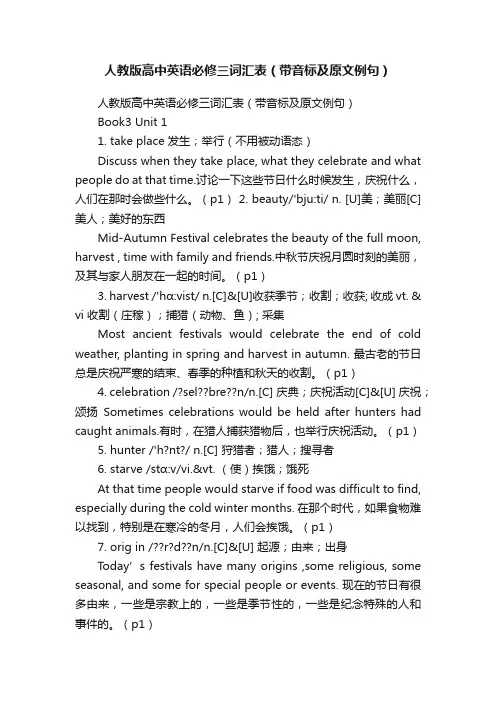
人教版高中英语必修三词汇表(带音标及原文例句)人教版高中英语必修三词汇表(带音标及原文例句)Book3 Unit 11. take place 发生;举行(不用被动语态)Discuss when they take place, what they celebrate and what people do at that time.讨论一下这些节日什么时候发生,庆祝什么,人们在那时会做些什么。
(p1) 2. beauty/'bju:ti/ n. [U]美;美丽[C]美人;美好的东西Mid-Autumn Festival celebrates the beauty of the full moon, harvest , time with family and friends.中秋节庆祝月圆时刻的美丽,及其与家人朋友在一起的时间。
(p1)3. harvest /'hɑ:vist/ n.[C]&[U]收获季节;收割;收获; 收成vt. & vi 收割(庄稼);捕猎(动物、鱼); 采集Most ancient festivals would celebrate the end of cold weather, planting in spring and harvest in autumn. 最古老的节日总是庆祝严寒的结束、春季的种植和秋天的收割。
(p1)4. celebration /?sel??bre??n/n.[C] 庆典;庆祝活动[C]&[U] 庆祝;颂扬Sometimes celebrations would be held after hunters had caught animals.有时,在猎人捕获猎物后,也举行庆祝活动。
(p1)5. hunter /'h?nt?/ n.[C] 狩猎者;猎人;搜寻者6. starve /stɑ:v/vi.&vt. (使)挨饿;饿死At that time people would starve if food was difficult to find, especially during the cold winter months. 在那个时代,如果食物难以找到,特别是在寒冷的冬月,人们会挨饿。
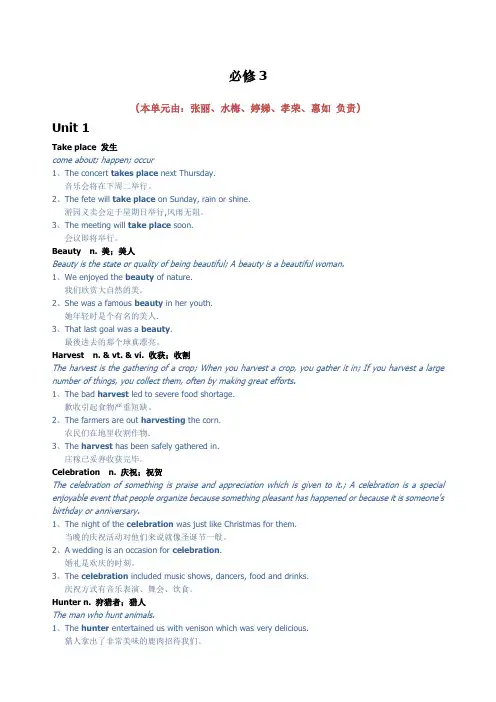
必修3(本单元由:张丽、水梅、婷娣、孝荣、惠如负责)Unit 1Take place 发生come about; happen; occur1、The concert takes place next Thursday.音乐会将在下周二举行。
2、The fete will take place on Sunday, rain or shine.游园义卖会定于星期日举行,风雨无阻。
3、The meeting will take place soon.会议即将举行。
Beauty n. 美;美人Beauty is the state or quality of being beautiful; A beauty is a beautiful woman.1、We enjoyed the beauty of nature.我们欣赏大自然的美。
2、She was a famous beauty in her youth.她年轻时是个有名的美人.3、That last goal was a beauty.最後进去的那个球真漂亮。
Harvest n. & vt. & vi. 收获;收割The harvest is the gathering of a crop; When you harvest a crop, you gather it in; If you harvest a large number of things, you collect them, often by making great efforts.1、The bad harvest led to severe food shortage.歉收引起食物严重短缺。
2、The farmers are out harvesting the corn.农民们在地里收割作物.3、The harvest has been safely gathered in.庄稼已妥善收获完毕。
必修3(本单元由:张丽、水梅、婷娣、孝荣、惠如负责)Unit 1Take place 发生come about; happen; occur1、The concert takes place next Thursday.音乐会将在下周二举行。
2、The fete will take place on Sunday, rain or shine.游园义卖会定于星期日举行,风雨无阻。
3、The meeting will take place soon.会议即将举行。
Beauty n. 美;美人Beauty is the state or quality of being beautiful; A beauty is a beautiful woman.1、We enjoyed the beauty of nature.我们欣赏大自然的美。
2、She was a famous beauty in her youth.她年轻时是个有名的美人.3、That last goal was a beauty.最後进去的那个球真漂亮。
Harvest n. & vt. & vi. 收获;收割The harvest is the gathering of a crop; When you harvest a crop, you gather it in; If you harvest a large number of things, you collect them, often by making great efforts.1、The bad harvest led to severe food shortage.歉收引起食物严重短缺。
2、The farmers are out harvesting the corn.农民们在地里收割作物.3、The harvest has been safely gathered in.庄稼已妥善收获完毕。
高中英语必修3重点词汇,短语,句子复习总结人教版新课标高中英语必修3重点词汇,短语,句子复习总结必修三M3 Unit1重点单词starve plenty satisfy feast huntorigin trick independence gather harvest agricultural custom admire energetic shapereligious social permission possibility grateful apologize sadness obvious forgive decorate award ancestor festival beauty celebrate ancient light honor belief spirit Christian weep wipe event sweetspoet drown heart-broken重点短语take place in memory of play a trick onlook forward to as though have fun with sb.turn up keep one’s word hold one’s breathdo harm to dress up day and nightset off throw away重点句子1.Festivals and celebrations of all kinds have been held everywhere since ancienttimes.2.Some festivals are held to honor the dead or to satisfy the ancestors, who mightreturn either to help or do harm.3.It’s now a children’s festival, when they can dress up and …….4.….. to honor Mohandas Gandhi, the leader who helped gain India’s dependencefrom Britain.5.China and Japan have mid-autumn festivals, when people admire the moonand …..6.Some western countries have very exciting festivals, which take place forty daysbefore Easter.7.The country, covered with cherry tree flowers, looks forward to the end of winter andto the coming of spring.8.She could be with her friend right now laughing at him.9. It’s obvious that the manager of the coffee shop was waiting …..必修三M3 Unit1重点单词starve plenty satisfy feast huntorigin trick independence gather heart-broken agricultural custom admire energetic harvestreligious social permission possibility grateful apologize sadness obvious forgive decorate ancestor award festival celebrate beautylight ancient shape belief spiritChristian event sweets poet drownhonor weep wipe independence重点短语take place in memory of play a trick onlook forward to as though have fun with sb.turn up keep one’s word hold one’s breathdo harm dress up day and nightset off throw away重点句子1.Festivals and celebrations of all kinds have been held everywhere since ancienttimes.2.Some festivals are held to honor the dead or to satisfy the ancestors, who mightreturn either to help or to do harm.3.It is now a children’s festival, when they can dress up and ….4.… to honor Mohandas G andhi, the leader who helped gain India’s independence.5.China and Japan have mid-autumn’s festivals, when people admire the moon……6.Some western countries have very exciting carnivals, which take place forty daysbefore Easter.7.The country, covered with cherry tree flowers looks as though it is covered with pinksnow.8.The most energetic and important festivals are the ones that look forward to the endof the winter and to the coming of the spring.必修三. M3 Unit 2重点单词diet energy digestion balance roastought slim curiosity research customer weakness strength debt gently limitbenefit sigh combine item packetserve business frustrate fit cooperation menu fat heavy curiosity hostess discount raw fried barbecue fibreconsult warmly advertise admit offer重点短语balanced diet ought to lose weightput on some weight on one’s way even thoughthrow away according to rather thanamount to cut down before longbe amazed at feel sick in debtbe tired of be curious about get away withtell lies get rid of in research ofearn one's living glare at benefit fromtake off重点句子1.But don’t you think it would be better if you were a bit thinner?2.So that is what they did.3.Their balanced diets became such a success that before long Wang Peng becameslimmer and Yong Hui put on more weight.4.… but I f ound your menu so limited that I stopped worrying and startedadvertising ….5.Wang Peng sat in his empty restaurant feeling very frustrated.6.He thought of his mutton, beef and bacon cooked in the …..7.Suddenly he saw his friend Li Chang hurrying by.8.Something terrible must have happened, if ……9.Even though the customers might get thin after eating ….10.He did not look forward to being in debt ….11.They were both enjoying dumplings and breast of chicken cooked with garlic.必修三M3 unit3重点单词scene permit stare account appearance patience silly jealous unbelievable rudemanner scream indeed decade humorcharacter director passage pound wealthspot author reserve survive doubtoffer advantage order pavement luckydessert follow steak wander wonder/wonderful fault businessman funny amazing seekpleasure scream genuine fake issuebow jail crime properly重点短语make a bet go ahead by accidentaccount for to be honest shoulder to shoulderin rags even if care aboutget into trouble as a matter of fact as for…give/pay attention to bring up be known as/forat this moment lead the way give upon the contrary on one’s way a large amount ofin a … manner take care of earn a livingfrom the bottom of my heart重点句子1.Dressed in th e finest clothes, he drove by the brothers’ house in Portland Place, and,seeing they were back, went to get Portia at …..2.I never would have believed it.3.I must give you a job, as I promised.4.You have got a job open that I want5.…. But not worth on e tenth as much as how Henry feltabout Portia.6.It’s well-known that Americans like to eat a lot7.Would you mind waiting just a few minutes?I wonder, Mr. Adams, if you’d mind us asking a few questions?8.But it’s all I have on me.9.I hope you’ll come here whenever you like.You must come whenever you want and have whatever you like.10.I found myself carried out to sea by a strange wind.11.It was the ship that brought you to England.12.The fact is that I earned my passage by working as an unpaid hand, which accountsfor my appearance.13.At this moment, they see a penniless young man wandering on the pavement outsidetheir house.14.It’s Henry Adams, an American businessman, who is lost in London ….必修三. M3 Unit4重点单词astronomy atmosphere system violent solidexplode surface harmful development spread method depend exist presence disappointed publish gravity force gradually cheer combine explore settle fundamental allow atom mystery chain reaction multiply dinosaur produce oxygen generally climate lessen exhausting approach faint opportunity carbon dioxide solve thus crash feed重点短语think of…as… in time cool downgo by now that come into existencebe different form lay eggs give birth toon one’s surface a s well as prevent ... fromescape from get close to cheer upbreak out to one’s disappointment as a result ofbe harmful to sb depend on in one’s presencewatch out in one’s turn重点句子1.That empty hole is like a mouth always needing to be fed.2.I cheered up immediately … watching the earth become smaller….3.We watched, amazed as the fire broke out on the outside of the spaceship.4.This disappearance made possible the rise of mammals on the earth.This produced a chain reaction, which made it possible for life to develop.5.…. The earth may becom e too hot to live on.6.They are putting too much carbon dioxide into the atmosphere, which prevent heatfrom escaping the earth into space.7.So whether life will continue on the earth for the millions of year to come will dependon whether this problem can be solved.…. It was not clear whether the shape would last or not.必修三. M3 Unit5重点单词minister continent eastward surround harbor extremely settle within border figureterrify official wealthy distance flow downtown traditionbroad bush fall schoolmate approximately coast measure chat rapidly scenery manager complete aboard nearby cowboy prize realize slightly distant urban port fresh tourcross confirm coast重点短语be/go on a trip rather than catch sight ofas well as because of go on a tour ofgo through as far as be surrounded bysettle down have a gift for at dawnbe close to figure out in the distance重点句子1.… there was frost on the ground, confirming that fall had arrived in Canada.2.The thought that they could cross the whole continent was exciting.Some people have the idea that you can …., but they forget the fact that ….3.People say it is Canada’s most beautiful city, surrounded by mountains and thePacific Ocean.4.It’s so wet there that the trees are extremely tall, some measuring over 90 meters.5.The next stop was Calgary, which is famous for the Calgary Stampede.6.The girls were surprised at the fact that ocean ships can sail up the Great Lakes.7.… they could see the misty cloud that rose from the great Niagara Falls, which is onthe south side of the lake.As they sat in a buffet restaurant looking over the …,a youngman sat down with them.。
人教版高中英语必修三词汇表(含教材例句及词汇用法讲解)Book3 Unit 11. take place 发生;举行(不用被动语态)Discuss when they take place, what they celebrate and what people do at that time.讨论一下这些节日什么时候发生,庆祝什么,人们在那时会做些什么。
(p1)In the past ten years, great changes have taken place in my hometown.在过去的十年里,我的家乡发生了巨大变化。
The film festival takes place in October. 电影节将于十月举行。
My brother’s wedding will take place on May1st. 我哥哥的婚礼将于5月1日举行。
【拓展】take sb's/sth's place = take the place of sb/sth 代替;替换She couldn't attend the meeting so her assistant took her place.她不能参加会议,所以她的助手代她出席。
Computers have taken the place of typewriters in most offices.在大多数办公室,电脑已经取代了打字机。
Mulan took her father’s place to fight in the army.= Mulan took the place of her father to fight in the army.她替父从军打仗。
2. beauty /'bju:ti/ n.①[U] 美;美丽Mid-Autumn Festival celebrates the beauty of the full moon, harvest , time with family and friends.中秋节庆祝月圆时刻的美丽,及其与家人朋友在一起的时间。
必修3(本单元由:张丽、水梅、婷娣、孝荣、惠如负责)Unit 1Take place 发生come about; happen; occur1、The concert takes place next Thursday.音乐会将在下周二举行。
2、The fete will take place on Sunday, rain or shine.游园义卖会定于星期日举行,风雨无阻。
3、The meeting will take place soon.会议即将举行。
Beauty n. 美;美人Beauty is the state or quality of being beautiful; A beauty is a beautiful woman.1、We enjoyed the beauty of nature.我们欣赏大自然的美。
2、She was a famous beauty in her youth.她年轻时是个有名的美人.3、That last goal was a beauty.最後进去的那个球真漂亮。
Harvest n. & vt. & vi. 收获;收割The harvest is the gathering of a crop; When you harvest a crop, you gather it in; If you harvest a large number of things, you collect them, often by making great efforts.1、The bad harvest led to severe food shortage.歉收引起食物严重短缺。
2、The farmers are out harvesting the corn.农民们在地里收割作物.3、The harvest has been safely gathered in.庄稼已妥善收获完毕。
必修3(本单元由:张丽、水梅、婷娣、孝荣、惠如负责)Unit 1Take place 发生come about; happen; occur1、The concert takes place next Thursday.音乐会将在下周二举行。
2、The fete will take place on Sunday, rain or shine.游园义卖会定于星期日举行,风雨无阻。
3、The meeting will take place soon.会议即将举行。
Beauty n. 美;美人Beauty is the state or quality of being beautiful; A beauty is a beautiful woman.1、We enjoyed the beauty of nature.我们欣赏大自然的美。
2、She was a famous beauty in her youth.她年轻时是个有名的美人.3、That last goal was a beauty.最後进去的那个球真漂亮。
Harvest n. & vt. & vi. 收获;收割The harvest is the gathering of a crop; When you harvest a crop, you gather it in; If you harvest a large number of things, you collect them, often by making great efforts.1、The bad harvest led to severe food shortage.歉收引起食物严重短缺。
2、The farmers are out harvesting the corn.农民们在地里收割作物.3、The harvest has been safely gathered in.庄稼已妥善收获完毕。
Celebration n. 庆祝;祝贺The celebration of something is praise and appreciation which is given to it.; A celebration is a special enjoyable event that people organize because something pleasant has happened or because it is someone's birthday or anniversary.1、The night of the celebration was just like Christmas for them.当晚的庆祝活动对他们来说就像圣诞节一般。
2、A wedding is an occasion for celebration.婚礼是欢庆的时刻。
3、The celebration included music shows, dancers, food and drinks.庆祝方式有音乐表演、舞会、饮食。
Hunter n. 狩猎者;猎人The man who hunt animals.1、The hunter entertained us with venison which was very delicious.猎人拿出了非常美味的鹿肉招待我们。
2、The hunter put the lion's head on the wall as a trophy.猎人把狮子的头挂在墙上当纪念品。
3、The hunter seized a porcupine.猎人捕获了一只豪猪。
Starve vi. & vt. (使)饿死;饿得要死If people starve, they suffer greatly from lack of food which sometimes leads to their death.1、Thousands of cattle are starving.成千上万的牛正在挨饿.2、They tried to starve him into submission.他们试图用饥饿来使他屈服。
3、Don't starve the kitten.别饿着小猫。
Origin n. 起源;由来;起因The point at which something comes into existence or from which it derives or is derived.1、The origins of the custom are unknown.该风俗起源不详.2、The illness is organic in origin.该病起初是器质性疾患。
3、They reported that all potatoes today have a single origin in southern Peru.他们的报告指出,现在的土豆都是同起源于秘鲁的南部。
Religious adj. 宗教上的;信奉宗教的;虔诚的You use religious to describe things that are connected with religion or with one particular religion.1、The religious affairs have been reestablished.宗教事务已经恢复。
2、Mahatma Gandhi was both a political and a religious figure in Indian history.甘地在印度历史上是政治和宗教要人。
3、But courage and religious faith alone are not enough to win battles.但是单凭勇气和宗教信仰要打胜仗还是不够的。
Ancestor n. 祖先;祖宗Your ancestors are the people from whom you are descended.1、His ancestors had come to England as refugees.他的祖先来到英国的时候是难民.2、She has worshipped her ancestor.她已拜过她的祖先。
3、The abacus is the ancestor of the modern computer.算盘是现代电脑的原型。
In memory of 纪念;追念if something is done in memory of someone who has died, it is done so that the person is not forgotten, and to show respect for them.1、They presented a sum of money to the college in memory of their son.他们向学院赠送了一笔款项以纪念他们的儿子。
2、He founded the charity in memory of his late wife.他兴办那项慈善事业以纪念他已故的妻子。
3、The Dr. Sun Yat-sen Memorial, as the name suggests, is a memorial built in memory of Dr. Sun Yat-sen.国父纪念馆,顾名思义,是建来纪念国父的纪念馆。
Mexico n. 墨西哥(拉丁美洲国家)a country to the south of the US and to the north of Guatemala.1、In Mexico they were able to live high on a moderate income.在墨西哥他们能靠中等的收入过豪华的生活。
2、We got a way for you to get to Mexico.我们安排好让你去墨西哥。
3、we know he fled to Mexico.我们知道他飞往墨西哥。
Feast n. 节日;盛宴A feast is a large and special meal.1、Enough is as good as a feast.知足常乐。
2、Preparing for the Christmas Eve feast makes me at my wit's end.筹办圣诞宴会简直使我智穷才竭。
3、Christmas is an important feast for Christians.圣诞节是基督教徒的一个重要节日。
Bone n. 骨;骨头Your bones are the hard parts inside your body which together form your skeleton.1、This fish has a lot of bones in it.这种鱼有很多刺.2、I've broken a bone in my arm.我的臂部骨折了.3、Her bones were laid to rest.她的屍骨已下葬.Belief n. 信任;信心;信仰Belief is a feeling of certainty that something exists, is true, or is good. Your religious or political beliefs are your views on religious or political matters.1、His firmness on his belief supported him in difficulties.困境中,他坚定的信仰支撑着他。
2、I haven't much belief in his honesty.我对他的诚实缺乏足够的信心.3、He acted in accordance with his beliefs.他按照自己的信念行事.Dress up 盛装;打扮;装饰If you dress up or dress yourself up, you put on different clothes, in order to make yourself look smarter than usual or to disguise yourself.1、She dress up in Elizabethan costume for the fancy-dress ball.她穿上伊丽莎白的服装去参加化妆舞会。